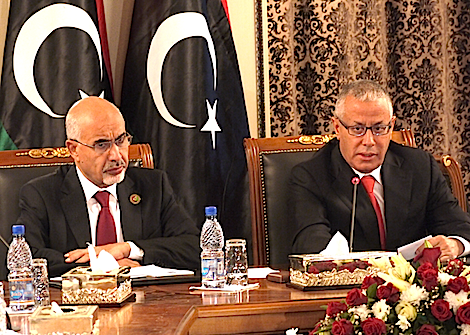By George Grant and Mohammed Elsharif.

Tripoli, 21 November:
Intended to signal the dawn of a new era of openness and transparency in . . .[restrict]Libya, the government opened up its first formal cabinet meeting to the press today, held in the grand oval cabinet room of the prime minister’s office in Tripoli.
In addition to Prime Minister Ali Zeidan and his government, a raft of senior officials were in attendance at the gathering, including National Congress President Mohamed Magarief, Grand Mufti Sheikh Sadiq Al-Ghariani, Supreme Court Chief Justice Kamal Dhan, and Chief of Staff General Yousef Mangoush.
Significant for its symbolism as much as what was said, the meeting nevertheless produced several points worthy of record. At the invitation of Prime Minister Zeidan, Mohamed Magarief was first to address the assembled audience, and used the opportunity to impart a few words of advice to the new cabinet as it prepared to embark on its work.
Central to his message was the importance of honesty and transparency in every aspect of the government’s affairs, in particular where money was concerned.
“In the past, we have been governed by rules that have been issued under a tyrannical and unjust authority”, Magarief said. “I would like to talk about… the mess in administration [and] the chaos… which is predominating over the work of most of us, [as well as] corruption and the bad exploitation of money.
“In this respect”, Magarief continued, “the people have the right to expect a lot of us… They have the right to tell us that they do not understand or they do not accept how their money was spent”.
The need for the government to listen to and respect the citizens to which it is ultimately accountable was a central and recurring theme of Magarief’s message.
Zeidan himself largely confined his remarks to greetings and thanks, but underlined his rationale for organising today’s meeting: “to show that all the institutions of Libya are in one hand working together”.
Pointedly skipping over the 42 years of Qaddafi’s authoritarian dictatorship, Zeidan also took a moment to list Libya’s previous prime ministers, emphasising the importance of picking up from where they left off. “Libya was started by these men, ladies and gentlemen”, he reminded his audience.
Perhaps the most radical remarks of the morning were delivered by Sheikh Ghariani, who exhorted Libya’s rulers to bring radical Islamists into the fold by acceding to their demands little by little.
Libya did not possess “any groups that we should be scared of”, Ghariani said, adding that “if we can give them what they want, such as the application of Sharia law, but if we can do it by degrees, [then] we can bring them by our side”.
Too often, the mufti continued, “these radical groups are provoked by the other side with their statements. We should bring them by our side with good words and promises that we will do what they want, but in stages”.
As to how the members of Libya’s new government carried out their own work, Ghariani was unequivocal: “The true believers are not the people who go to Haj everyday, they are the great rulers who rule with justice. There is no ruler who gets to heaven if he is not just”. [/restrict]









